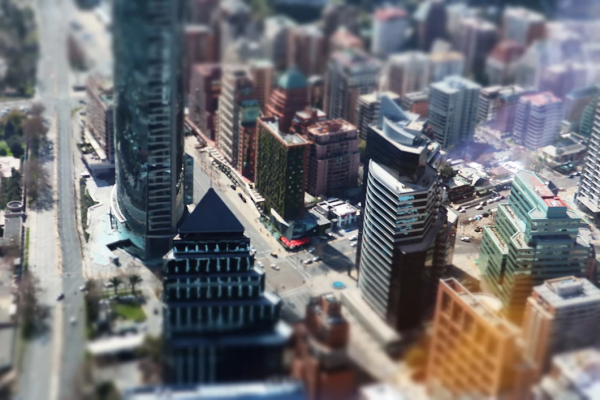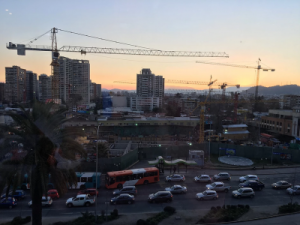Finding an organization willing to work with me on my independent research project has been much harder than I originally anticipated. Since the beginning of the semester, Lise-Anne, the resident director of the GW Chile program, has helped me search and apply to many different sites related to my interests, which include sustainability, environment, climate change, energy security, natural resources, etc. I was hoping that whatever organization I ended up working at would in some way be able to advance my originally proposed research topic, in which I sought to investigate public opinion versus the reality of energy security in Santiago. The Nature Conservancy, Asociación chilena de Energías Renovables, and Fundación Terram are just a few of the organizations that I looked into, but each of them were unavailable to work with me for various reasons.
After soliciting my topic of interest and my original research proposal for a few weeks, I received a reply from Professor Pablo Osses, who works in the geography department at Pontificia Universidad Católica (PUC)—one of the best universities in Latin America, and the university which I have the privilege of attending during my study abroad. Professor Osses showed a lot of interest in my research plan, and he recommended that I apply to intern at an organization in which he has contacts.
Bird and Cable (Valparaiso, Chile)
The organization, Asociación Gremial de Generadoras De Chile (Generadoras de Chile for short), works together with the country's main electric power generators to promote the efficient usage of energy sources, technological development, and innovation under the principles of sustainability, safety, quality, and competitiveness. They partner with many types of electricity generating producers, including hydro, solar, wind, thermal, bio, and geothermic. They not only work with the industrial side of energy generation, but they are also involved with the political regulation of electricity production, transmission, and distribution. Furthermore, they promote public policies and best practices for the generation and usage of electricity, which means that they are also involved with the societal aspect of energy consumption.
Generadoras de Chile seemed like the ideal place to intern because the organization has a lot of insight on a wide range of Chile’s energy usage. However, the organization only works with one source of energy: electricity. Nonetheless, I believed that I could learn a lot about the electricity sector in Chile, which is a huge part of energy security, and it could without a doubt help me develop my research. I also did not have much of a choice, considering that about six other organizations were not readily available to work with me. Therefore, I sent Generadoras de Chile my resume, and I was received for an interview the following week.
Once I was officially accepted as an intern, I was invited to meet more of the staff to talk about my work and my plans for my research project. Our meetings were at a beautiful office in Las Condes, and I have enjoyed going there and exploring Santiago’s more professional business district. I began to discuss my research ideas with Rodrigo Solís (the director of contents and studies), Jorge Gómez (the environmental consultant), and Macarena Alvarez (the communications and best practices coordinator). They allowed me to explain my primary interests and goals, which include interning with them and researching under the assistance of Professor Osses in order to write a paper relating to energy security in Chile, and in the end receiving credits that I require for my studies at George Washington University (GW). Discussing this made me excited to finally pursue something I am so passionate about, and the independency of my project, while nerve racking, has given me a lot of energy. At the same time, our meetings were often challenging because speaking in Spanish is still a huge work in progress for me. Fortunately, everyone so far, including Professor Osses and the staff at my internship, have been patient, positive, and kind, which is essential for a productive work environment.
City Construction (Sunset over the commune of Ñuñoa)
Through our lengthy discussions, I have developed my original research proposal to be more specific and elaborate, while maintaining the core ideas that interest me the most. Instead of broadly aiming to research public opinion vs. the reality of energy security in Santiago, my new goal is to investigate the prospects of decarbonization in all of Chile, and finding out how this could impact energy security within the country. Knowing the resources that are now available to me, I am interested in focusing on the energy security of electricity in particular, excluding other energy sources such as natural gas. This limitation will allow me to write a research paper that is more clearly focused.
Finding a perfect title for my research project continues to be a work in progress. This is because my paper is being written in Spanish, and some words simply do not translate accurately. For instance, I am still having a lot of difficulty finding the right translation for “energy security” and “resiliency” which are key concepts that will re-emerge often throughout my paper. This is a challenge that I anticipate will come up again and again while I write, but I look forward to learning and improving my language skills.
Each week, as I work more with my internship and have meetings with my advising professor, I grow more excited about my research. I have started to read articles and documents about how different energy systems work in Chile, and next I look forward to researching more about other countries in Latin America, as well as countries in developed areas of the world, in order to compare case studies of decarbonization. What I am perhaps looking forward to the most is traveling throughout Chile to observe the different aspects of energy security and how they vary geographically. This will take considerably more planning, but as of now, I am hoping to work on the observational part of my research beginning in February, before my second semester in Santiago begins.
Kethelyn Papp, GEB 2016-17
Research Project: An Energizing Start
Humphries Awardee, Kethelyn Papp, GEB 2016-17, discusses her experience experience of starting her internship and research project in Santiago, Chile
November 2, 2018

Bird's Eye of Santiago (Photo taken from Costanera Center, the tallest building in Latin America)



